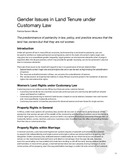| dc.contributor.author | Kameri-Mbote, Patricia | |
| dc.date.accessioned | 2013-06-27T13:17:35Z | |
| dc.date.available | 2013-06-27T13:17:35Z | |
| dc.date.issued | 2005 | |
| dc.identifier.citation | Gender Issues in Land Tenure under Customary Law | en |
| dc.identifier.uri | http://www.capri.cgiar.org/pdf/brief_land-05.pdf | |
| dc.identifier.uri | http://erepository.uonbi.ac.ke:8080/xmlui/handle/123456789/41243 | |
| dc.description.abstract | Under all systems of law in many African countries, land ownership is anchored in patriarchy. Law can
be used to reinforce or make permanent social injustices, and, in the realm of women’s rights, legal rules
may give rise to or exacerbate gender inequality. Legal systems can also become obstacles when change is
required: often the de jure position, which may provide for gender neutrality, cannot be achieved in practice
due to numerous obstacles.
There are three issues to be noted with regard to law in its governance of tenure relationships:
• Statute books contain legal rules and principles that are or can be seen as legitimizing the subordination
of women.
• The structure and administration of laws can occasion the subordination of women.
• The socioeconomic and patriarchal realities in many African countries prevent the translation of abstract
rights into real substantive rights. | en |
| dc.language.iso | en | en |
| dc.publisher | International Environmental Law Research Centre | en |
| dc.title | Gender Issues in Land Tenure under Customary Law | en |
| dc.type | Article | en |
| local.publisher | Department of Private Law, University of Nairobi | en |

